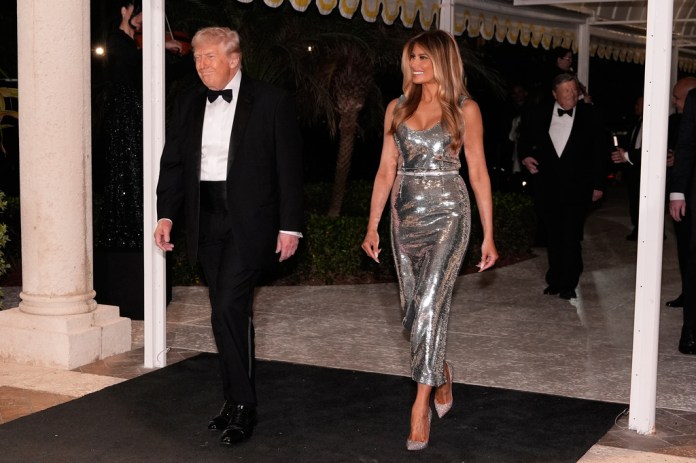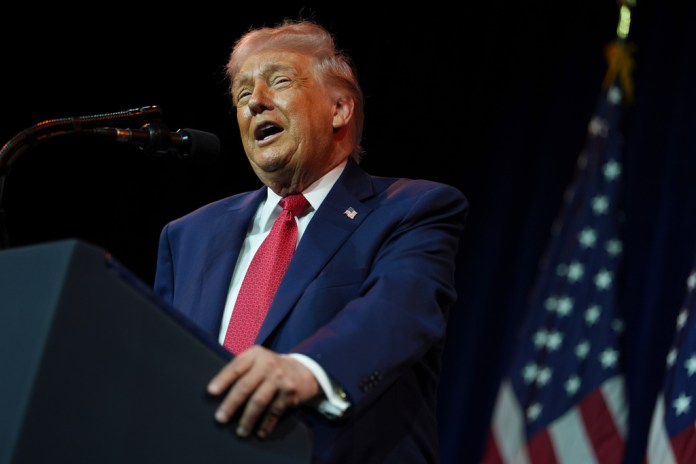The people around Trump influencing his policy agenda – Washington Examiner
The article discusses the various advisors and influences shaping Donald Trump’s policy agenda as he campaigns for a potential second term as president. It highlights that, despite his strong personality, many individuals are vying for his attention to influence his policies on crucial issues such as immigration, TikTok regulation, and abortion.
Key figures mentioned include Stephen Miller, a hardline immigration advisor pushing for increased deportations; Kellyanne Conway, who has shifted Trump’s stance on TikTok in favor of leveraging the platform’s popularity; and social conservatives who are urging Trump to adopt stricter abortion policies. The article also touches upon Robert F. Kennedy Jr., whose endorsement of Trump has given him new insights into health policy, which Trump aims to prioritize if reelected.
The article portrays a complex landscape where Trump’s inner circle is characterized by a mix of traditional conservative voices and emerging advisors who seek to mold his platforms ahead of the election, all while Trump himself navigates the pressures and demands of different factions within the Republican Party.
The people around Trump influencing his policy agenda
Former President Donald Trump could win another term in the Oval Office in 48 days. As he battles to become the country’s 47th president, there is no shortage of people looking to gain coveted access to his inner circle as they bid to influence the next administration’s agenda.
From immigration to abortion, Trump has been pulled right and left. The task is hard. He’s a strong personality who has proven nearly impossible to corral.
Here’s a rundown on whose advice Trump is heeding and ignoring as he forms his policy agenda.
Stephen Miller
In 2015, Trump announced his presidential campaign after famously riding down a golden escalator in his own skyscraper. During the speech that catapulted him to the center of the country’s political discourse, Trump didn’t mention deportation despite illegal immigration forming part of the heart of his campaign.
In 2024, as he spoke at the Republican National Convention, Trump explicitly stated his promise “to launch the largest deportation operation in the history of our country.”
What happened in nine years? Some of the shift could be pinned on Stephen Miller, a longtime adviser in the Trump administration.
Miller is known for his hard-line views on immigration and was the chief architect of Trump’s illegal immigration crackdown during his first term in office. He has backed increasing deportation efforts for years, including forwarding an article arguing that the United States should deport immigrants via train “to scare out the people who want to undo our country” in November 2017.
Trump made deportation comments from time to time, but no massive actions to remove millions ensued. Top Republicans downplayed his rhetoric.
“We are not planning on erecting a deportation force,” former Rep. Paul Ryan, who was the Republican speaker of the House at the time, said in 2016. “Donald Trump’s not planning on that.”
“The pressure from the White House was always more about the wall,” a former senior Department of Homeland Security official told the Washington Post. “We didn’t really get significant pressure in the first term on deportations,” he added.
Nonetheless, Miller pressed on. Last November, he told the New York Times that “mass deportation will be a labor-market disruption celebrated by American workers, who will now be offered higher wages with better benefits to fill these jobs.”
Miller’s push for harsher border policies seems to be finally wearing off on Trump.
In April, Trump conducted an interview with Time that provided more details about a deportation effort.
He said he would use local law enforcement, the National Guard, and even America’s military to carry out the operation. He didn’t rule out using mass detention centers throughout the process.
His words sounded remarkably similar to Miller’s comments last November.
“So you go around the country arresting illegal immigrants in large-scale raids, you have to have somewhere to put them,” Miller said during an interview with conservative activist Charlie Kirk. “So you create this efficiency by having these standing facilities where planes are moving off the runway constantly — probably military aircraft, some existing DHS assets — and that’s how you’re able to scale.”
Kellyanne Conway
In 2020, Trump proposed a ban on TikTok. Now, he has a following of more than 11 million users on the platform. What happened?
One of Trump’s closest advisers, who served as his White House counselor, could help explain the shift.
Through her involvement in the Club for Growth, Kellyanne Conway lobbied for the Chinese-owned app on Capitol Hill even as Congress eyed legislation to do away with it. Her open advocacy for the organization could illuminate Trump’s turnabout on TikTok.
During the final year of his presidency, Trump signed an executive order that effectively banned the Chinese-owned app. Although Biden revoked the measure in 2021, Tiktok once again rose to the forefront of policy debate after China invaded U.S. airspace with multiple spy balloons.
Club for Growth has been one of the loudest conservative groups to stand against a TikTok ban. As a consultant for the group, Conway personally made the argument to Trump several times that outlawing TikTok would push voters away from the GOP, according to Politico.
“I made clear that it’s Trump’s supporters who are organically posting on TikTok their support for him and his reelection,” Conway said in an interview with the New York Times.
Social conservatives push Trump on abortion
A staunch defender of the Supreme Court’s 2022 decision in Dobbs v. Jackson Women’s Health Organization, which determined that abortion should be left up to states that get to decide their own abortion laws, Trump has remained steadfast in opposing a national ban on abortion.
His position has angered social conservatives, including Kansas City Chiefs kicker Harrison Butker, who has channeled his voice as a prominent Catholic athlete to pressure the Trump campaign further to the right on abortion policy.
Butker has tried to gain the ear of Sen. J.D. Vance (R-OH), a fellow conservative Catholic, and promote his views on abortion policy.
After Trump said, “My administration will be great for women and reproductive rights,” the football star pushed back on X.
“I implore my fellow Catholic @JDVance to help bring the Republican Party back in line with the foundational platform that all life is valuable and there can be no compromise when it comes to defending the unborn,” Butker wrote.
Butker’s attempts to get Vance to bring Trump further to the right on abortion seem to have backfired. The Ohio senator has touted the campaign’s talking point that Trump would veto a national ban on abortion. Furthermore, Trump appears to lack interest in discussing abortion policy with his Catholic running mate.
“Your running mate J.D. Vance has said that you would veto [a national abortion ban] if it did come to your desk,” ABC moderator Linsey Davis said during Trump’s first debate with Harris.
“Well, I didn’t discuss it with J.D. in all fairness. J.D. — and I don’t mind if he has a certain view, but I think he was speaking for me, but I really didn’t,” Trump replied.
Butker is just one member of a powerful coalition of conservatives that has butted heads with Trump on abortion policy.
In April, the head of Susan B. Anthony Pro-Life America said she was “deeply disappointed” in Trump. Though Trump says “the will of the people” with varying opinions on abortion laws in different regions across the country should stand, that’s not enough for other Republicans such as Sen. Lindsey Graham (R-SC). He has tried to pull Trump back into a more traditionally socially conservative stance.
“If you’re turning the pro-life movement into a geographical movement, I think you’re making a mistake,” he said in July. “A child at 15 weeks sucks his thumb, feels pain in California and New York as much as South Carolina.”
RFK Jr.
Since Robert F. Kennedy Jr. suspended his campaign to endorse the former president last month, he has emerged as the premier voice on health policy influencing Trump. He recently said that during conversations with Trump, the former president said he wanted tackling the chronic disease epidemic to be “his legacy” if he wins a second term.
Kennedy also announced that Trump and his inner circle had made a “general commitment” to work together and “invited him to form a unity government.”
Kennedy’s run for the presidency during the 2024 election cycle posed a tangible threat to Trump. At the height of his campaign, Kennedy garnered roughly 15% of support from the U.S. electorate. With a tight race shaping up between Trump and Harris, courting Kennedy’s endorsement and the trust of his supporters appeared to be part of the key to the former president’s strategy to clinch a second term.
Since Kennedy dropped out of the race nearly four weeks ago, evidence has piled up that Trump is adopting his message on chronic disease. In posts to social media, the former president frequently backs Kennedy’s “Make America Healthy Again” campaign, which seeks to root conflicts of interest out of federal health agencies.
Trump is also echoing Kennedy’s rhetoric as he stumps around the country.
These days, he can be found touting his former rival’s “Make America Healthy Again” slogan at rallies.
“We’re going to get toxic chemicals out of our environment, and we’re going to get them out of our food supply,” Trump said at a recent Pennsylvania event. “We’re going to get them out of our bodies.”
" Conservative News Daily does not always share or support the views and opinions expressed here; they are just those of the writer."




